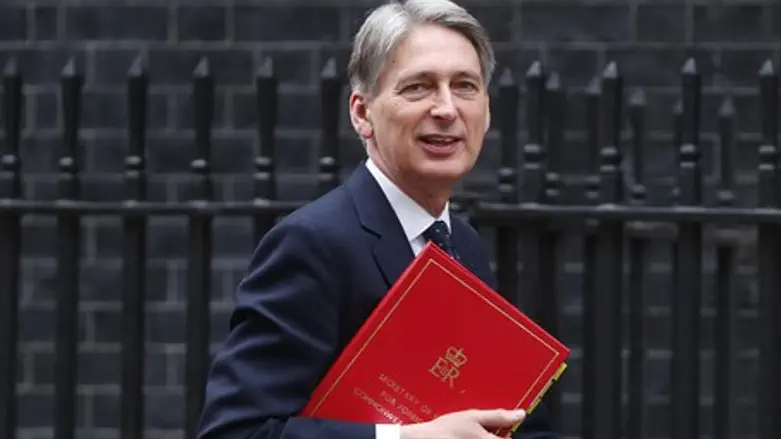
Britain's foreign secretary reopened his country's embassy in Tehran on Sunday in a step of rapprochement, four years after an Iranian mob said to be directed by the government stormed the compound, forcing its closure.
Philip Hammond's two-day trip comes five weeks after Britain and five other world powers struck a nuclear deal with the leading state sponsor of terrorism - and his visit was met by Iranian student groups that protested the "illegal" reopening of the embassy.
He led a ceremony shortly after noon in the embassy garden with Ajay Sharma, the new charge d'affaires who will be Britain's top diplomat in Tehran.
Iran's embassy in London also reopened on Sunday. The two nations are expected to appoint ambassadors within months, although Iranian Deputy Foreign Minister Majid Takht Ravanchi said Saturday that "we are not considering to send Iran's ambassador to Britain."
Hammond, the first British foreign secretary to visit Iran since Jack Straw in 2003, described the violence that shuttered the Tehran mission as "a low point" but said a new journey was beginning.
"Over the coming months, we will work to ensure that the nuclear agreement is a success, including by making sure that it is fully implemented by all sides," Hammond said at the reopening.
"Through this embassy's efforts we will support British trade and investment, once sanctions are lifted. That will bring benefits for Britain and the Iranian people."
Hammond's talk of full implementation by all sides comes a day after Iranian President Hassan Rouhani vowed to breach the deal's limitations on weapons and rocket trade, and as Iran promises to flout the deal further by holding ballistic missile tests.
Lifting of sanctions
Hammond was to later hold a press conference with Mohammad Javad Zarif, Iran's foreign minister and lead negotiator in the nearly two years of talks that have ended Tehran's isolation from the West.
European officials have been quick to visit Iran since July 14, when the nuclear agreement with Britain, China, France, Germany, Russia and the United States was announced in Vienna.
The deal will see the lifting of economic sanctions - imposed as punishment over Iran's controversial nuclear program - in exchange for limited curbs on its atomic activities and a new inspections regime that will have Iran inspect its own covert nuclear facilities.
The nuclear deal has sparked a flurry of interest from countries seeking to reconnect with the oil-rich Islamic republic, whose 78 million people are seen as an untapped market for many industries.
The thaw between Britain and Iran started with the June 2013 presidential election victory of Hassan Rouhani, who launched a campaign to renew trade with the West. Hammond is to meet him on Monday.
"We have seen our relationship steadily improve, step by step," Hammond said, mentioning Prime Minister David Cameron's meeting with Rouhani in New York last autumn, the first at that level between the countries since the 1979 Islamic revolution.
Shared challenges ahead
"Last month's historic nuclear agreement was another milestone, and showed the power of diplomacy, conducted in an atmosphere of mutual respect, to solve shared challenges," Hammond added.
Following the 2011 embassy attack, Britain said it could not have happened without the tacit consent of the Iranian regime at the time, particularly given the participation of members the Basij paramilitary force led by the Iranian Revolutionary Guards.
It took place after lawmakers voted to expel the British ambassador and reduce trade relations in retaliation for nuclear-related sanctions against Iran's banking sector.
Students rampaged for hours through the embassy compound, tearing down the British flag, ripping up pictures of Queen Elizabeth II and trashing offices. Staff were seized by protesters.
Diplomatic relations were reduced to their lowest possible level, with Britain expelling Iran's officials.
But Hammond said London and Tehran should now be ready to discuss shared problems, including the spread of the Islamic State (ISIS) jihadist group in Syria and Iraq.
Plans to reopen the embassy were announced in June last year.
Sharma was appointed in a non-resident position in November 2013 and has since visited Iran 12 times. Hammond and treasury minister Damian Hinds are visiting Tehran with a small trade delegation to discuss business opportunities.
Hammond follows his Italian, French and German counterparts who all visited Iran after the nuclear deal.
Europe is keen on renewing trade ties with Iran, and most countries have diplomatic representation in Tehran.
The United States, which led the nuclear talks, has not had diplomatic relations with Iran since 1979 following the 444-day hostage crisis that followed the storming of its Tehran embassy.
The nuclear deal is undergoing a bruising review in the US Congress, with US President Barack Obama threatening to veto any vote against the controversial agreement.
AFP contributed to this report.